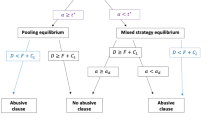Abstract.
Illegal collusion is a widespread phenomenon all around the world. Yet, models of hierarchical agency relationships tend not to predict collusion. This paper demonstrates that a natural requirement of interim efficiency suffices for collusion to appear in equilibrium in a simple standard setting. The optimal extent of collusion depends on the efficacy of the legal system. When the transaction costs associated with illegal deals are small enough, inducing some illegal collusion between the agent and his supervisor increases the principal's payoff.
Similar content being viewed by others
Author information
Authors and Affiliations
Additional information
Received: 9 December 1996 / Accepted: 11 April 1998
Rights and permissions
About this article
Cite this article
Lambert-Mogiliansky, A. On optimality of illegal collusion in contracts. Rev Econ Design 3, 303–328 (1998). https://doi.org/10.1007/s100580050018
Issue Date:
DOI: https://doi.org/10.1007/s100580050018




